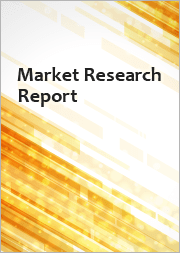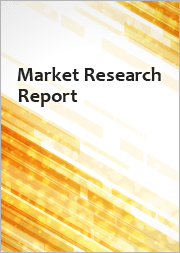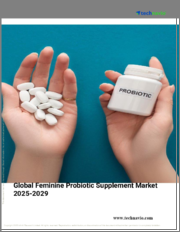
|
시장보고서
상품코드
1848380
장 건강 및 마이크로바이옴 보충제 시장 예측 : 제품 유형별, 성분별, 제제별, 유통 채널별, 용도별, 최종사용자별, 지역별 분석(-2032년)Gut Health and Microbiome Supplement Market Forecasts to 2032 - Global Analysis By Product Type, Ingredient, Formulation, Distribution Channel, Application, End User, and By Geography |
||||||
Stratistics MRC에 따르면 세계의 장 건강 및 마이크로바이옴 보충제 시장은 2025년에 144억 달러, 예측 기간 동안 CAGR 8.8%로 성장하고 2032년까지는 261억 달러에 이를 전망입니다.
장 건강 및 마이크로바이옴 보충제 시장은 프로바이오틱스, 프리바이오틱스, 신바이오틱스, 포스트바이오틱스, 장내 마이크로바이옴을 통한 소화기의 건강, 면역 기능, 웰빙 전반의 서포트를 목적으로 하는 테일러 메이드 제제에 초점을 맞추었습니다. 성장의 원동력이 되는 것은 마이크로바이옴의 균형과 건강 결과를 관련시키는 과학적 증거의 확대, 예방 헬스케어에 대한 관심 증가, 개별화 영양에 대한 소비자 수요입니다. 균주 고유의 조사, 전달 시스템, 임상 검증의 진보가 신뢰성을 높이고 있습니다.
국제식품정보협의회(IFIC)의 2022년 조사에 따르면 미국인 4명 중 1명이 장의 건강이 건강 전반에서 가장 중요한 측면이라고 생각하고 있으며 소비자의 의식과 관련 제품에 대한 수요가 높다는 것을 보여줍니다.
천연 및 식물 기반 보충제에 대한 수요 증가
이 시장은 천연 소재와 식물 유래의 웰니스 솔루션에 대한 소비자의 기울기가 현저한 것이 큰 추진력이 되고 있습니다. 현대의 소비자는 합성 성분에 대한 경계심을 강화하고 있으며, 보다 깨끗한 라벨과 인지도가 높은 공급원에서 유래하는 제품을 요구하고 있습니다. 이 추세는 식물성분과 천연 계통의 프로바이오틱스와 프리바이오틱스의 효능을 검증하는 조사 증가에 의해 더욱 강해지고 있습니다. 그 결과 제조업체는 비유전자 재조합, 유기농, 지속가능한 식물 유래 보충제의 개발에 많은 투자를 하고, 이 건강 지향 소비자의 윤리관에 직접 합치하고, 적정한 제품 혁신과 마케팅을 통해 시장 확대를 추진하고 있습니다.
고급 보충제 제형의 높은 비용
보다 광범위한 시장 침투를 막는 주요 요인은 고급 마이크로바이옴 보충제의 가격이 높다는 것입니다. 이러한 제품은 임상적으로 연구된 특허받은 박테리아 균주, 지연 방출 캡슐과 같은 고급 전달 시스템, 효능과 순도에 대한 엄격한 제3자 기관의 시험을 포함하는 경우가 많습니다. 관련 연구 개발, 품질 보증 비용은 상당한 것으로, 소비자에게 전가됩니다. 이 때문에 특히 가격에 민감한 신흥 시장에서는 잠재적인 구매자의 대부분에 큰 가격 장벽이 되어 시장 전체의 성장을 억제하고 있습니다.
보충제와 기능성 식품 및 음료의 통합
프로바이오틱스 주스, 프리바이오틱스 스낵 바, 발효 음료와 같은 제품의 강화는 편리하고 개별적인 섭취 방법을 제공하고 정제를 삼키는 것을 싫어하는 사람들에게 어필할 수 있습니다. 이 전략은 전통적인 보충 사용자뿐만 아니라보다 광범위한 건강 의식이있는 계층으로 시장을 효과적으로 확장합니다. 게다가 매일 지속을 촉구하고 지속적인 마이크로바이옴 지원을 가능하게 하기 위해서, 보충제 제조업체와 식품 및 음료 기업과의 업계를 넘은 콜라보레이션의 큰 기회가 됩니다.
잠재적인 부작용과 유해 반응
이 시장은 초기 팽만감, 가스, 면역 결핍 환자에서 더 심각한 부작용 등 부작용의 가능성이라는 지속적인 위협에 직면하고 있습니다. 이러한 상황이 발생하면 소비자의 부정적인 검토 및 제품 반품으로 이어지고 심각한 경우에는 법적 과제 및 규제 당국의 감시를 받게 됩니다. 이러한 사건은 브랜드 또는 보다 광범위한 보충제 카테고리에 대한 소비자의 신뢰를 빠르게 손상시킬 수 있습니다. 이러한 위협을 완화하고 시장의 신뢰성을 유지하기 위해서는 투명한 표시, 명확한 용법 및 용량을 유지하고 소비자 교육에 투자하는 것이 매우 중요합니다.
COVID-19의 영향 :
유행은 장내 건강 보충제 시장의 기폭제가 되었습니다. 건강한 장내 세균총을 견고한 면역 기능과 연관시키는 조사가 퍼져 프로바이오틱스와 프리바이오틱스 수요가 급증했습니다. 그러나 이 성장은 세계적인 공급망과 원료 조달의 혼란으로 인해 일시적인 공급 부족과 생산 지연으로 인해 발생했기 때문에 초기 기세는 약화되었습니다. 팬데믹은 적극적인 건강관리에 대한 소비자의 의식이 높아지는 영구적인 유산을 남기고 시장은 결국 적응했습니다.
예측기간 동안 프로바이오틱스 분야가 최대가 될 전망
프로바이오틱스 분야가 가장 큰 시장 점유율을 차지할 것으로 예상되지만, 이는 강력한 과학적 검증과 소비자의 깊은 친밀감에 뿌리를 둔 우위성을 기반으로 합니다. 수십 년에 걸친 임상 연구는 특정 프로바이오틱스 균주가 소화기계의 건강, 면역 지원, 심지어 정신 건강에 도움이 된다는 것을 결정적으로 입증하고 있으며, 소비자와 건강 전문가들은 이러한 제품에 높은 신뢰를 보이고 있습니다. 게다가, 프로바이오틱스는 마이크로바이옴 분야에서 가장 성숙하고 명확하게 정의된 카테고리이며, 시판되는 선택도 풍부하게 갖추어져 있습니다. 이와 같이 확립된 시장에서의 존재감과 입증된 효능으로, 프로바이오틱스는 장내 건강 솔루션을 추구하는 소비자의 대다수에게 있어서 기본적이고 가장 신뢰할 수 있는 선택이 되고 있습니다.
액체 및 구미 분야는 예측 기간 중 가장 높은 CAGR이 예상
액체 및 구미 분야는 즐겁고 편리한 보충제 형식으로 소비자 선호의 근본적인 변화로 인해 가장 높은 성장률을 나타낼 것으로 예측됩니다. 이러한 전달 시스템은 어린이, 노인, 전통적인 정제 및 캡슐을 삼키기가 어려운 사람과 같은 주요 층에 특히 매력적입니다. 또한, 구미의 쾌적한 맛과 씹는 성질은 매일 보충 섭취의 지속성을 향상시킵니다. 시장 세분화는 설탕을 사용하지 않는 옵션, 천연 향, 고활성 제제 등의 혁신을 통해 이러한 추세를 활용하고 있으며, 이 시장을 가장 역동적이고 빠르게 확대하는 분야로 삼고 있습니다.
최대 점유율을 차지하는 지역 :
예측 기간 동안 북미가 가장 큰 시장 점유율을 차지할 것으로 예측됩니다. 이 주도적 지위는 소비자의 건강 의식의 높이, 왕성한 가처분 소득, 영양 보조 식품의 소매 및 E-Commerce 기반의 확립 등 몇 가지 중요한 요인 때문입니다. 이 지역에는 장 - 건강 - 면역계의 관련성에 대한 충분한 지식을 가진 성숙한 소비자층이 존재하며 일관된 수요를 견인하고 있습니다. 게다가 주요 시장 기업의 존재, 적극적인 마케팅 전략, 소비자의 신뢰를 불러일으키는 견고한 규제 프레임워크은 북미 시장의 지배적 지위를 견고하게 하고 있습니다.
CAGR이 가장 높은 지역:
예측 기간 동안 아시아태평양이 가장 높은 CAGR을 나타낼 것으로 예측됩니다. 이러한 폭발적인 성장은 가처분 소득 증가, 건강 의식 증가, 예방 건강 관리에 대한 의식 증가 등 급속히 확대되는 중간 소득층에 의해 뒷받침됩니다. 도시화와 서양의 건강 동향의 영향으로 소비자는 영양 보충제를 더 받아들이기 쉽습니다. 게다가 중국과 인도와 같은 국가들은 엄청난 인구 기반을 가지고 있으며 아직 충분히 침투하지 않은 엄청난 시장 기회가 있습니다. 현지 제조업체도 지역의 선호에 맞춘 저렴한 제품을 적극적으로 개발하고 있으며, 매우 역동적이고 급성장하는 시장 상황을 만들어 내고 있습니다.
무료 주문을 받아서 만드는 서비스:
이 보고서를 구독하는 고객은 다음 무료 맞춤설정 옵션 중 하나를 사용할 수 있습니다.
- 기업 프로파일
- 추가 시장 기업의 종합적 프로파일링(3개사까지)
- 주요 기업의 SWOT 분석(3개사까지)
- 지역 세분화
- 고객의 관심에 응한 주요국 시장 추정, 예측 및 CAGR(주 : 타당성 확인에 따름)
- 경쟁 벤치마킹
- 제품 포트폴리오, 지리적 존재, 전략적 제휴에 기반한 주요 기업 벤치마킹
목차
제1장 주요 요약
제2장 서문
- 개요
- 이해관계자
- 조사 범위
- 조사 방법
- 데이터 마이닝
- 데이터 분석
- 데이터 검증
- 조사 접근
- 조사 자료
- 1차 조사 자료
- 2차 조사 자료
- 전제조건
제3장 시장 동향 분석
- 성장 촉진요인
- 억제요인
- 기회
- 위협
- 제품분석
- 용도 분석
- 최종 사용자 분석
- 신흥 시장
- COVID-19의 영향
제4장 Porter's Five Forces 분석
- 공급기업의 협상력
- 구매자의 협상력
- 대체품의 위협
- 신규 참가업체의 위협
- 경쟁 기업간 경쟁 관계
제5장 세계의 장 건강 및 마이크로바이옴 보충제 시장 : 제품 유형별
- 프로바이오틱스
- 프리바이오틱스
- 신바이오틱스
- 포스트 바이오틱스
- 효소
- 기타 제품 유형
제6장 세계의 장 건강 및 마이크로바이옴 보충제 시장 : 성분별
- 박테리아
- 효모
- 섬유
제7장 세계의 장 건강 및 마이크로바이옴 보충제 시장 : 제제별
- 캡슐과 정제
- 파우더 및 주머니
- 액체 및 구미
제8장 세계의 장 건강 및 마이크로바이옴 보충제 시장 : 유통 채널별
- 하이퍼마켓 및 슈퍼마켓
- 약국 및 드럭스토어
- 온라인 소매/E-Commerce
- 전문점
제9장 세계의 장 건강 및 마이크로바이옴 보충제 시장 : 용도별
- 소화기계의 건강
- 면역 지원
- 체중 관리
- 정신 건강과 인지 건강
- 기타 용도
제10장 세계의 장 건강 및 마이크로바이옴 보충제 시장 : 최종 사용자별
- 성인
- 어린이
- 고령자
제11장 세계의 장 건강 및 마이크로바이옴 보충제 시장 : 지역별
- 북미
- 미국
- 캐나다
- 멕시코
- 유럽
- 독일
- 영국
- 이탈리아
- 프랑스
- 스페인
- 기타 유럽
- 아시아태평양
- 일본
- 중국
- 인도
- 호주
- 뉴질랜드
- 한국
- 기타 아시아태평양
- 남미
- 아르헨티나
- 브라질
- 칠레
- 기타 남미
- 중동 및 아프리카
- 사우디아라비아
- 아랍에미리트(UAE)
- 카타르
- 남아프리카
- 기타 중동 및 아프리카
제12장 주요 발전
- 계약, 파트너십, 협업, 합작투자
- 인수와 합병
- 신제품 발매
- 사업 확대
- 기타 주요 전략
제13장 기업 프로파일링
- Nestle Health Science
- Bayer AG
- Church & Dwight Co., Inc.
- NOW Health Group
- Danone SA
- Procter & Gamble Co.
- BioGaia AB
- Dr. Willmar Schwabe GmbH & Co. KG
- Amway Corporation
- Reckitt Benckiser Group plc
- DSM-Firmenich
- Yakult Honsha Co., Ltd.
- Seed Health, Inc.
- Pendulum Therapeutics
- BIOHM Health
- Seres Therapeutics, Inc.
- Ferring BV
- BiomeBank
- International Flavors & Fragrances Inc.(IFF)
- OptiBiotix Health Plc
According to Stratistics MRC, the Global Gut Health and Microbiome Supplement Market is accounted for $14.4 billion in 2025 and is expected to reach $26.1 billion by 2032 growing at a CAGR of 8.8% during the forecast period. Gut health and microbiome market focuses on probiotics, prebiotics, synbiotics, postbiotics, and tailored formulations aimed at supporting digestive health, immune function, and overall wellbeing via the gut microbiome. Growth is driven by expanding scientific evidence linking microbiome balance to health outcomes, rising preventive healthcare interest, and consumer demand for personalized nutrition. Advances in strain-specific research, delivery systems, and clinical validation enhance credibility.
According to a 2022 survey by the International Food Information Council (IFIC), one in four Americans considered gut health to be the most important aspect of their overall health, indicating high consumer awareness and demand for related products.
Market Dynamics:
Driver:
Growing demand for natural and plant-based supplements
The market is significantly propelled by a pronounced consumer pivot towards natural and plant-based wellness solutions. Modern consumers are increasingly wary of synthetic ingredients, seeking cleaner labels and products derived from recognizable sources. This trend is amplified by a growing body of research validating the efficacy of botanicals and natural strains of probiotics and prebiotics. Consequently, manufacturers are heavily investing in developing supplements from non-GMO, organic, and sustainable plant sources, directly aligning with this health-conscious consumer ethos and driving market expansion through targeted product innovation and marketing.
Restraint:
High cost of advanced supplement formulations
A primary factor limiting broader market penetration is the elevated price point of advanced microbiome supplements. These products often incorporate clinically studied, patented bacterial strains, sophisticated delivery systems like delayed-release capsules, and rigorous third-party testing for potency and purity. The associated research, development, and quality assurance costs are substantial and are passed on to the consumer. This creates a significant price barrier for a large segment of potential buyers, particularly in price-sensitive emerging markets, thereby restricting the overall market growth.
Opportunity:
Integration of supplements with functional foods and beverages
The fortification of products like probiotic juices, prebiotic snack bars, and fermented drinks offers a convenient and discrete consumption method, appealing to those who dislike swallowing pills. This strategy effectively expands the market reach beyond traditional supplement users to a broader health-aware demographic. Moreover, it encourages daily adherence and allows for continuous microbiome support, presenting a significant opportunity for cross-industry collaboration between supplement manufacturers and food and beverage companies.
Threat:
Potential side effects and adverse reactions
The market faces a persistent threat from the potential for side effects, such as initial bloating, gas, or more serious adverse reactions in immunocompromised individuals. These incidents, when they occur, can lead to negative consumer reviews, product returns, and in severe cases, legal challenges or regulatory scrutiny. Such events can rapidly erode consumer trust in a brand or even the broader supplement category. Maintaining transparent labeling, clear dosage instructions, and investing in consumer education is crucial to mitigate this threat and uphold the market's credibility.
Covid-19 Impact:
The pandemic served as a catalyst for the gut health supplement market, as consumers became intensely focused on bolstering their innate immunity. Widespread research linking a healthy gut microbiome to robust immune function drove a surge in demand for probiotics and prebiotics. However, this growth was tempered by initial disruptions in the global supply chain and raw material sourcing, leading to temporary shortages and production delays. The market ultimately adapted, with the pandemic leaving a lasting legacy of heightened consumer awareness about proactive health management.
The probiotics segment is expected to be the largest during the forecast period
The probiotics segment is projected to account for the largest market share, a dominance rooted in strong scientific validation and deep-rooted consumer familiarity. Decades of clinical research have conclusively established the benefits of specific probiotic strains for digestive wellness, immune support, and even mental health, giving consumers and healthcare professionals high confidence in these products. Furthermore, probiotics represent the most mature and well-defined category within the microbiome space, with an extensive range of over-the-counter options available. This established market presence and proven efficacy make probiotics the default and most trusted choice for a majority of consumers seeking gut health solutions.
The liquids & gummies segment is expected to have the highest CAGR during the forecast period
The liquids and gummies segment is anticipated to register the highest growth rate, driven by a fundamental shift in consumer preference towards enjoyable and convenient supplement formats. These delivery systems are particularly appealing to key demographics such as children, seniors, and anyone who has difficulty swallowing traditional pills or capsules. Additionally, the pleasant taste and chewable nature of gummies improve adherence to daily supplement regimens. Manufacturers are capitalizing on this trend by innovating with sugar-free options, natural flavors, and high-potency formulations, making this the most dynamic and rapidly expanding segment in the market.
Region with largest share:
During the forecast period, the North America region is expected to hold the largest market share. This leadership position is attributed to several key factors, including high consumer health awareness, strong disposable income, and a well-established retail and e-commerce infrastructure for dietary supplements. The region has a mature consumer base that is well-informed about the gut-health-immune-system connection, driving consistent demand. Moreover, the presence of major market players, aggressive marketing strategies, and a robust regulatory framework that inspires consumer confidence collectively solidify North America's dominant position in the market.
Region with highest CAGR:
Over the forecast period, the Asia Pacific region is anticipated to exhibit the highest CAGR. This explosive growth is fueled by a rapidly expanding middle class with increasing disposable income, rising health consciousness, and growing awareness of preventive healthcare. Urbanization and the influence of Western health trends are making consumers more receptive to dietary supplements. Furthermore, the vast population base in countries like China and India presents an immense, yet under-penetrated, market opportunity. Local manufacturers are also actively developing affordable products tailored to regional preferences, creating a highly dynamic and fast-growing market landscape.
Key players in the market
Some of the key players in Gut Health and Microbiome Supplement Market include Nestle Health Science, Bayer AG, Church & Dwight Co., Inc., NOW Health Group, Danone S.A., Procter & Gamble Co., BioGaia AB, Dr. Willmar Schwabe GmbH & Co. KG, Amway Corporation, Reckitt Benckiser Group plc, DSM-Firmenich, Yakult Honsha Co., Ltd., Seed Health, Inc., Pendulum Therapeutics, BIOHM Health, Seres Therapeutics, Inc., Ferring B.V., BiomeBank, International Flavors & Fragrances Inc. (IFF), and OptiBiotix Health Plc.
Key Developments:
In June 2025, Danone announces the acquisition of The Akkermansia Company (TAC), a Belgian company with nearly 20 years of history and science, specializing in biotics. Expanding deeper into gut health is a key facet of Danone's Renew strategy, as it doubles down on science and innovation, and as consumer interest in healthy products continues to rise.
In April 2025, DSM-Firmenich launched its Healthy Longevity innovation platform at Vitafoods Europe 2025, focusing on gut health and healthy aging.
In March 2024, Garden of Life, a Nestle Health Science brand, launched Non-GMO and USDA Organic Certified probiotics within its sports nutrition portfolio promoting digestive health.
Product Types Covered:
- Probiotics
- Prebiotics
- Synbiotics
- Postbiotics
- Enzymes
- Other Product Types
Ingredients Covered:
- Bacteria
- Yeast
- Fibers
Formulations Covered:
- Capsules & Tablets
- Powder & Sachets
- Liquids & Gummies
Distribution Channels Covered:
- Hypermarkets/Supermarkets
- Pharmacies & Drug Stores
- Online Retail/E-commerce
- Specialty Stores
Applications Covered:
- Digestive Health
- Immune Support
- Weight Management
- Mental & Cognitive Health
- Other Applications
End Users Covered:
- Adults
- Children
- Elderly
Regions Covered:
- North America
- US
- Canada
- Mexico
- Europe
- Germany
- UK
- Italy
- France
- Spain
- Rest of Europe
- Asia Pacific
- Japan
- China
- India
- Australia
- New Zealand
- South Korea
- Rest of Asia Pacific
- South America
- Argentina
- Brazil
- Chile
- Rest of South America
- Middle East & Africa
- Saudi Arabia
- UAE
- Qatar
- South Africa
- Rest of Middle East & Africa
What our report offers:
- Market share assessments for the regional and country-level segments
- Strategic recommendations for the new entrants
- Covers Market data for the years 2024, 2025, 2026, 2028, and 2032
- Market Trends (Drivers, Constraints, Opportunities, Threats, Challenges, Investment Opportunities, and recommendations)
- Strategic recommendations in key business segments based on the market estimations
- Competitive landscaping mapping the key common trends
- Company profiling with detailed strategies, financials, and recent developments
- Supply chain trends mapping the latest technological advancements
Free Customization Offerings:
All the customers of this report will be entitled to receive one of the following free customization options:
- Company Profiling
- Comprehensive profiling of additional market players (up to 3)
- SWOT Analysis of key players (up to 3)
- Regional Segmentation
- Market estimations, Forecasts and CAGR of any prominent country as per the client's interest (Note: Depends on feasibility check)
- Competitive Benchmarking
- Benchmarking of key players based on product portfolio, geographical presence, and strategic alliances
Table of Contents
1 Executive Summary
2 Preface
- 2.1 Abstract
- 2.2 Stake Holders
- 2.3 Research Scope
- 2.4 Research Methodology
- 2.4.1 Data Mining
- 2.4.2 Data Analysis
- 2.4.3 Data Validation
- 2.4.4 Research Approach
- 2.5 Research Sources
- 2.5.1 Primary Research Sources
- 2.5.2 Secondary Research Sources
- 2.5.3 Assumptions
3 Market Trend Analysis
- 3.1 Introduction
- 3.2 Drivers
- 3.3 Restraints
- 3.4 Opportunities
- 3.5 Threats
- 3.6 Product Analysis
- 3.7 Application Analysis
- 3.8 End User Analysis
- 3.9 Emerging Markets
- 3.10 Impact of Covid-19
4 Porters Five Force Analysis
- 4.1 Bargaining power of suppliers
- 4.2 Bargaining power of buyers
- 4.3 Threat of substitutes
- 4.4 Threat of new entrants
- 4.5 Competitive rivalry
5 Global Gut Health and Microbiome Supplement Market, By Product Type
- 5.1 Introduction
- 5.2 Probiotics
- 5.3 Prebiotics
- 5.4 Synbiotics
- 5.5 Postbiotics
- 5.6 Enzymes
- 5.7 Other Product Types
6 Global Gut Health and Microbiome Supplement Market, By Ingredient
- 6.1 Introduction
- 6.2 Bacteria
- 6.3 Yeast
- 6.4 Fibers
7 Global Gut Health and Microbiome Supplement Market, By Formulation
- 7.1 Introduction
- 7.2 Capsules & Tablets
- 7.3 Powder & Sachets
- 7.4 Liquids & Gummies
8 Global Gut Health and Microbiome Supplement Market, By Distribution Channel
- 8.1 Introduction
- 8.2 Hypermarkets/Supermarkets
- 8.3 Pharmacies & Drug Stores
- 8.4 Online Retail/E-commerce
- 8.5 Specialty Stores
9 Global Gut Health and Microbiome Supplement Market, By Application
- 9.1 Introduction
- 9.2 Digestive Health
- 9.3 Immune Support
- 9.4 Weight Management
- 9.5 Mental & Cognitive Health
- 9.6 Other Applications
10 Global Gut Health and Microbiome Supplement Market, By End User
- 10.1 Introduction
- 10.2 Adults
- 10.3 Children
- 10.4 Elderly
11 Global Gut Health and Microbiome Supplement Market, By Geography
- 11.1 Introduction
- 11.2 North America
- 11.2.1 US
- 11.2.2 Canada
- 11.2.3 Mexico
- 11.3 Europe
- 11.3.1 Germany
- 11.3.2 UK
- 11.3.3 Italy
- 11.3.4 France
- 11.3.5 Spain
- 11.3.6 Rest of Europe
- 11.4 Asia Pacific
- 11.4.1 Japan
- 11.4.2 China
- 11.4.3 India
- 11.4.4 Australia
- 11.4.5 New Zealand
- 11.4.6 South Korea
- 11.4.7 Rest of Asia Pacific
- 11.5 South America
- 11.5.1 Argentina
- 11.5.2 Brazil
- 11.5.3 Chile
- 11.5.4 Rest of South America
- 11.6 Middle East & Africa
- 11.6.1 Saudi Arabia
- 11.6.2 UAE
- 11.6.3 Qatar
- 11.6.4 South Africa
- 11.6.5 Rest of Middle East & Africa
12 Key Developments
- 12.1 Agreements, Partnerships, Collaborations and Joint Ventures
- 12.2 Acquisitions & Mergers
- 12.3 New Product Launch
- 12.4 Expansions
- 12.5 Other Key Strategies
13 Company Profiling
- 13.1 Nestle Health Science
- 13.2 Bayer AG
- 13.3 Church & Dwight Co., Inc.
- 13.4 NOW Health Group
- 13.5 Danone S.A.
- 13.6 Procter & Gamble Co.
- 13.7 BioGaia AB
- 13.8 Dr. Willmar Schwabe GmbH & Co. KG
- 13.9 Amway Corporation
- 13.10 Reckitt Benckiser Group plc
- 13.11 DSM-Firmenich
- 13.12 Yakult Honsha Co., Ltd.
- 13.13 Seed Health, Inc.
- 13.14 Pendulum Therapeutics
- 13.15 BIOHM Health
- 13.16 Seres Therapeutics, Inc.
- 13.17 Ferring B.V.
- 13.18 BiomeBank
- 13.19 International Flavors & Fragrances Inc. (IFF)
- 13.20 OptiBiotix Health Plc



















